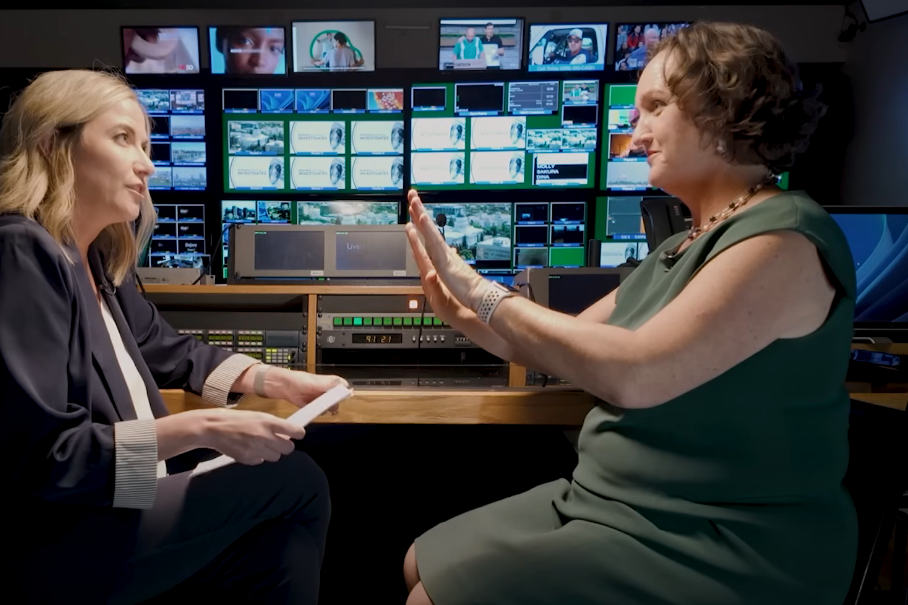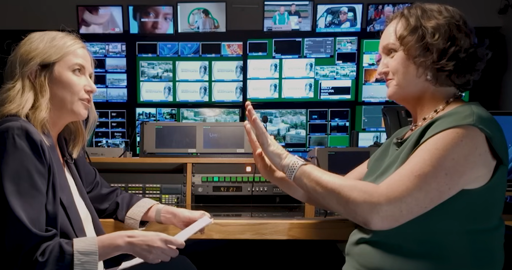
Photo: YouTube/@CBSSacramento
There are two big things going on in California politics right now. We are in the opening phase of what could be the most unpredictable gubernatorial election in ages, with a huge and changing field of candidates eager to succeed term-limited Gavin Newsom. Meanwhile, the governor is spearheading a loud and expensive ballot-initiative campaign to shift the state’s congressional map crucially toward Democrats, in an explicit response to Donald Trump’s efforts to grab midterm wins for Republicans via redistricting measures in states his party controls (most notably Texas).
Unsurprisingly, when CBS News reporter Julie Watts decided to interview gubernatorial candidates, she wanted very clear answers on how they felt about the ballot fight. And for the Democratic candidates, she also wanted to know if the intense anti-Trump messaging of the “Yes on 50” campaign would make it hard for them to appeal to Trump voters in 2026. It’s not a particularly rich line of inquiry, but it’s entirely legitimate.
So it got a lot of attention when Watts’s interview with former Democratic representative Katie Porter, who is leading the field in most of the early gubernatorial polling, went way off the rails:
Since this 3min excerpt of 30min segment went viral, we decided to post it ourselves. But I’d encourage you to watch the full segment. https://t.co/wHQcHbybqF @CBSNews @kcalnews @CBSSacramento @KPIXtv pic.twitter.com/A80fBGiFxE
— Julie Watts (@juliewattsTV) October 8, 2025
Porter objected to a question that included the premise that she might need Trump voters to win the governorship. After wrinkling her brow, Porter asked, “How would I need them to win, ma’am?” Watts responded, “You think everybody who did not vote for Trump will vote for you?” Porter affirmed, “In a general election, yes … If it’s me against a Republican, I think that I will win the people who did not vote for Trump.”
Watts then asked, “What if it is you against another Democrat?” And Porter replied, “I do not intend that to be the case.”
At this point, non-Californians may be confused. In a 2010 ballot initiative, Golden State voters abolished party primaries and inaugurated a so-called top-two system in which all candidates compete in an open primary, with the top two candidates — regardless of party — advancing to the general election. So it’s entirely possible that two Democrats (or in an alternative universe, two Republicans) could compete for the ultimate prize. It happened in the U.S. Senate elections of 2016 (in which Kamala Harris defeated Democratic representative Loretta Sanchez) and 2018 (when Dianne Feinstein defeated Democratic state-senate leader Kevin DeLeon). How Republican voters would deal with an all-Democratic general-election choice was of great interest in both races, though many Republicans chose to give the race a pass. In the most recent competitive statewide race, the Senate contest of 2024, Democrat Adam Schiff spent a lot of money attacking Republican Steve Garvey during the primary campaign. The goal was to herd angry Republicans into his column and make him Schiff’s general-election opponent, in the accurate expectation that Schiff would win that contest handily. And who was the third-place Democrat who was pushed out of the general election by the Schiff-Garvey squeeze play? Katie Porter. So she’s very familiar with this sort of scenario.
With that as background, maybe that’s why Porter bristled when Watts asked, “How do you intend this (a Democrat-on-Democrat general election) not to be the case? Are you going to ask them not to run?” After a brief digression in which Porter touted her ability to win in a “purple” House district earlier in her career, she challenged Watts to restate her question, which she did, and then soon thereafter Porter announced, “I’m not doing this anymore; I’m going to call it.”
To put it mildly, this did not go over well. Multiple Democratic rivals soon scolded Porter for losing her cool, as The Hill noted:
Former California State Controller Betty Yee (D), who is also running for governor, said in a post on X that it is clear Porter does not have the temperament to be governor.
“As a candidate, I welcome the hard questions — the next governor must be accessible and transparent,” Yee wrote on X. “No place for temper tantrums. No place for dodging the public’s right to know.”
There were plenty of safe answers Porter could have given to Watts’s hypothetical about needing Trump voters in a Democrat-on-Democrat general election. She could have pointed out that a goodly number of 2024 Trump voters were experiencing buyer’s remorse. She could have suggested that some Trump voters might appreciate the need for a counterbalance in Congress to the president’s power. And, of course, she could have said Republican voters choosing between two Democrats might appreciate her personal qualities, her drive and independence, and her determination to represent everyone. The reality is that nobody really knows what the dynamics will be surrounding a general election that’s 13 months away, so she could have answered with the equivalent of “I’ll cross that bridge when I reach it” and maybe even laughed.
The bottom line is that this was a predictable question Porter should have been able to answer or deflect, instead of giving the impression she’s writing off 40 percent of her state’s electorate and rejecting media questions that don’t simply invite her to repeat her message.
More on Politics
The Dangers of Trump’s National Guard AggressionWhy on Earth Is Eric Adams in Albania?MTG Blows Up GOP Shutdown Message With Health-Care Rant
From Intelligencer - Daily News, Politics, Business, and Tech via this RSS feed

